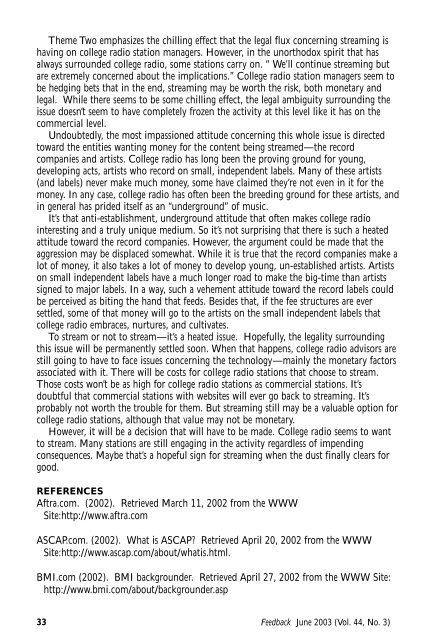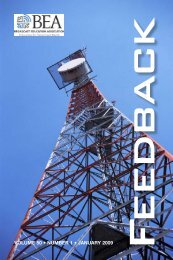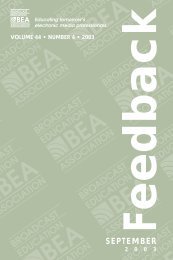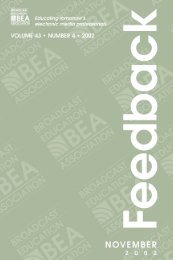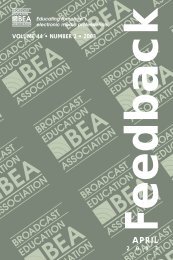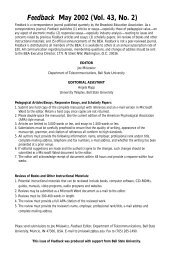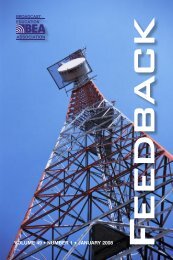JUNEFeedback
Issue 3 - Broadcast Education Association
Issue 3 - Broadcast Education Association
Create successful ePaper yourself
Turn your PDF publications into a flip-book with our unique Google optimized e-Paper software.
Theme Two emphasizes the chilling effect that the legal flux concerning streaming ishaving on college radio station managers. However, in the unorthodox spirit that hasalways surrounded college radio, some stations carry on. “ We’ll continue streaming butare extremely concerned about the implications.” College radio station managers seem tobe hedging bets that in the end, streaming may be worth the risk, both monetary andlegal. While there seems to be some chilling effect, the legal ambiguity surrounding theissue doesn’t seem to have completely frozen the activity at this level like it has on thecommercial level.Undoubtedly, the most impassioned attitude concerning this whole issue is directedtoward the entities wanting money for the content being streamed—the recordcompanies and artists. College radio has long been the proving ground for young,developing acts, artists who record on small, independent labels. Many of these artists(and labels) never make much money, some have claimed they’re not even in it for themoney. In any case, college radio has often been the breeding ground for these artists, andin general has prided itself as an “underground” of music.It’s that anti-establishment, underground attitude that often makes college radiointeresting and a truly unique medium. So it’s not surprising that there is such a heatedattitude toward the record companies. However, the argument could be made that theaggression may be displaced somewhat. While it is true that the record companies make alot of money, it also takes a lot of money to develop young, un-established artists. Artistson small independent labels have a much longer road to make the big-time than artistssigned to major labels. In a way, such a vehement attitude toward the record labels couldbe perceived as biting the hand that feeds. Besides that, if the fee structures are eversettled, some of that money will go to the artists on the small independent labels thatcollege radio embraces, nurtures, and cultivates.To stream or not to stream—it’s a heated issue. Hopefully, the legality surroundingthis issue will be permanently settled soon. When that happens, college radio advisors arestill going to have to face issues concerning the technology—mainly the monetary factorsassociated with it. There will be costs for college radio stations that choose to stream.Those costs won’t be as high for college radio stations as commercial stations. It’sdoubtful that commercial stations with websites will ever go back to streaming. It’sprobably not worth the trouble for them. But streaming still may be a valuable option forcollege radio stations, although that value may not be monetary.However, it will be a decision that will have to be made. College radio seems to wantto stream. Many stations are still engaging in the activity regardless of impendingconsequences. Maybe that’s a hopeful sign for streaming when the dust finally clears forgood.REFERENCESAftra.com. (2002). Retrieved March 11, 2002 from the WWWSite:http://www.aftra.comASCAP.com. (2002). What is ASCAP? Retrieved April 20, 2002 from the WWWSite:http://www.ascap.com/about/whatis.html.BMI.com (2002). BMI backgrounder. Retrieved April 27, 2002 from the WWW Site:http://www.bmi.com/about/backgrounder.asp33Feedback June 2003 (Vol. 44, No. 3)


